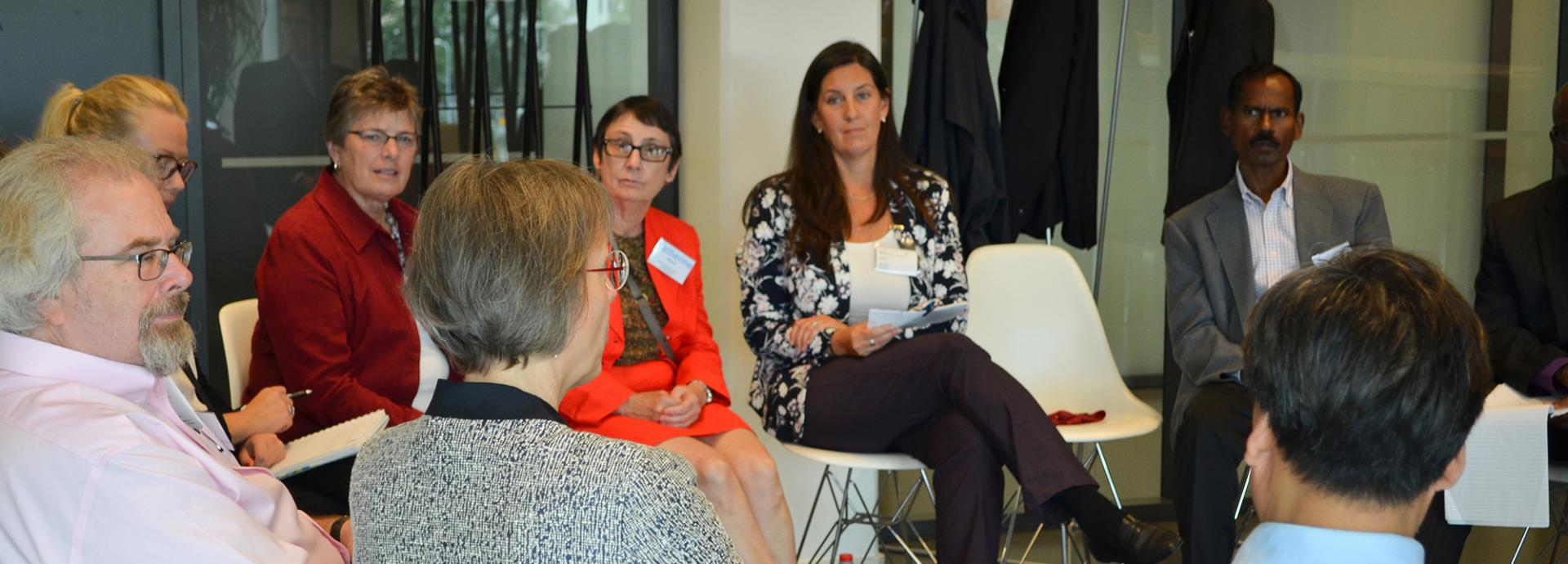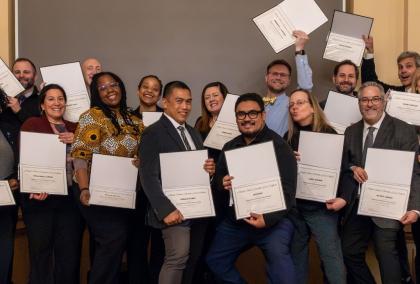

Note the summer break!
Early contact with your host institution in Finland is essential in order to properly prepare for your Fulbright experience. For example, if you will be teaching in Finland, the number of teaching assignments, contact hours, and similar matters have to be mutually agreed upon between the host and the grantee well before the beginning of the grant period.
Please note that it will be very difficult to reach your Finnish host and other personnel at Finnish universities during the summer, particularly in June and July, due to summer vacations. This is why it is important to be in contact with your host and arrange your Fulbright period-related matters before the summer begins.
Scholars
"Take the initiative to make sure that others at your host university know you are in town and possibly available for meetings or lectures. Your host department may not advertise your activities very widely, so you need to do this yourself.
In some cases, students may be interested in taking your courses even though they are technically enrolled in another department of your host university. If you make a point to advertise your courses more widely, then you can be sure of a more diverse class."
"I would suggest to future Fulbrighters to really spend time up front preparing for their teaching and research so that the limited time in Finland can be focused more on active engagement and collaboration with others. The time goes so quickly that the semester ends just as it seems to all start making sense!
I would also recommend finding out the exact expectations of key individuals at the host institution and try forging potential collaborative endeavors prior to arriving."
Initial concerns in preparing for your stay in Finland include the number and type of courses you will be teaching, or the type of research you will be conducting, and what is expected from both parties in preparation for these.
If you will be conducting research during your visit, you should find out whether or not any intellectual property rights issues (IPR) need to be discussed and/or agreed upon with your host.
Other important considerations include housing arrangements, particular types of equipment or scholarly resources required for your project, or perhaps special concerns related to family members who may accompany you.
“Advise Fulbrighters to ask all sorts of questions – even seemingly stupid ones – about the everyday administrative and practical aspects of everyday life in the higher education system here. It is so utterly different (better in some, not better in others) than that of the U.S. One thinks one “gets it”, but one doesn’t. Basic assumptions differ – about attendance in class, scheduling, the length of the term, independent reading, etc.
And, remember to point out that Finnish university students are excellent students – the top of their cohort. One can expect good work from them.”
- Former Fulbright lecturer grantee
Role of a Fulbright Scholar Host
The Checklist for a U.S. Scholar's Host outlines the responsibilities of a host welcoming a Fulbright Scholar. This checklist was sent to your Finnish host when the selection decisions were announced. You can also use it to prepare for your grant term and ensure that all key arrangements are in place.
Different Academic Culture
When you start preparing for your assignment at the host institution, remember that you are coming to a different academic culture. The arrangements at your host university will be different from what you are used to at home.
For example, if you have agreed to give a lecture course that meets two hours a week, it may mean 2 x 45 minutes and not two full hours, and a 3-credit course will most likely not mean the same thing as a 3-credit course at your own university, etc.
The key to successful planning is not taking things for granted or assuming that familiar-sounding terms are used in the same sense they are used in the U.S. You need to ask your hosts to explain what the local arrangements are like in detail.
Fulbright Specialists
As the grant period is short, from 2-6 weeks, many issues discussed in this Orientation Guide do not necessarily apply to specialists.
It is important to discuss with the Finnish host institution and mutually agree on the content and schedule of the visit to Finland.
It is largely up to the grantee and the host to decide what type of activities the grantee is involved in and what materials the grantee should bring along to Finland.
Mid-Career Professional Grantees
Due to the nature of your grant program, you have already established contacts with your host institution and you should be well aware of the individuals you will be associating with while you are here. These individuals are your best source of information on specialized preparation for your grant period - anything from materials you should bring along to asking for help in locating housing.
Prior to arriving in Finland, you should have a very clear idea of what is expected of you. It is also important for you to communicate to the host what your expectations are.
Students
Research students: Communicate your plan!
It is important that you have a clear plan of your activities well before you arrive in Finland and that your host university and contact persons are aware of your plans. You have your individual agendas and plans for your Fulbright term, which is why you should communicate these clearly to your host.
A strong alumni tip has been to arrange a virtual call with your host and make sure that
a) your host knows exactly what you are planning to do during your Fulbright period (explain to them what you are coming to do in Finland, especially if you are a research student)
b) you know what your host expects from you
c) the host knows what you expect from them and how often you would need to meet with your host
Make sure you have identified scholars willing to assist you in your field of interest while in Finland. These scholars are your best source of information on specialized preparation for your grant period - anything from materials you should bring along to reading or research that should be accomplished before departure from the United States.
What Is My Host's Role?
The Commitment to Host a Fulbright Research Student form outlines the responsibilities of a host welcoming a Fulbright Research Student. This checklist was signed by your Finnish host during the Fulbright application process. You can use it to prepare for your grant term and ensure that all key arrangements are in place.
Degree Students: University Enrollment and Class Registration
How to enroll as a new student in a Finnish university usually depends on your status (exchange student, visiting student, degree student, doctoral student). Even though you would come to the university primarily to conduct research, you would still need to register with the university.
Keep in mind that the registration deadlines for many autumn semester courses may be as early as August.
Find out from your host university what the specific enrollment instructions are, including class registration deadlines and methods. With Finnish universities, course registrations are often done through an online system during specific time periods throughout the year.
Keep in mind that the registration deadlines for many autumn semester courses may be as early as August. In some cases, you register for a course just by attending the first lecture or by writing an email to the teacher, but make sure you find out the registration methods well before the deadlines.
Course registrations may vary between faculties, departments, and courses within a university.
Student Discounts and Benefits
Student Unions provide various services for university students.
Under the Student Union Act, all Bachelor's and Master's degree students are required to join the Student Union.
Usually exchange students and sometimes visiting students can also join the Student Union, but are not obliged to do so. To become a member, one must pay the membership fee.
Student union membership entitles students to several considerable discounts:
- Student Health Service
- discounts on meal prices in the cafeterias on campus (examples on student cafeteria meal prices at the University of Oulu campus: basic student lunch EUR 2.60, soup lunch EUR 1.95, deli lunch EUR 4.95 and the special lunch EUR 4.40)
- at a number of shops, stores, and restaurants
- 30-55% discount on long distance train and bus fares
An organization called Frank issues the national student cards for higher degree students in Finland.
Doctoral Students, jatko-opiskelijat
The services and benefits for Bachelor’s, Master’s, and Doctoral students vary significantly in Finland.
Student Union membership is optional for Doctoral students and the membership benefits are far fewer. This results in Doctoral students having notably higher living costs than exchange or degree students.
Doctoral students are not entitled to subsidized meals, travel discounts, or Student Health Services. There are some student restaurants which offer a slightly more discounted lunch with the presentation of the Doctoral student card, but the meal price is still higher compared to the undergraduate and Master’s student prices.
Doctoral students usually have access to affordable university sports services at a subsidized price. A Doctoral student who has joined the student union is also entitled to services and benefits offered by the Student Union. Depending on the city, Doctoral students can have very limited access to student housing.
To find out what benefits you will be entitled to as a student in Finland, please contact your host university’s International Office well before arriving in Finland. This is a very important topic for you to consider when preparing your annual budget for your Fulbright term. Access to discounted student meals and student housing can significantly lower your living costs in Finland and vice versa.
Your host university’s International Office can also advise you on how to access the student card and where to find more information on the university’s Student Union. It is also important that you make sure you know when the deadline is when applying for the student card, and for registering with the Student Union. For some universities the deadlines can be very early in the fall semester, when you might still be in the U.S.
Teachers
Each teacher grantee and project is different, and therefore, the academic considerations may vary significantly from teacher to teacher. It is, however, always important to discuss this with the Finnish host institution, and to mutually agree on the content of the visit to Finland.
It is largely up to the grantee and the host to decide what type of activities the grantee is involved in. It is always good for the grantees to be active in creating contacts and taking the initiative.


